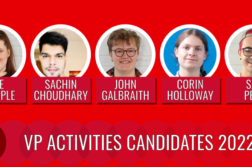Wessex Scene interview Amina Lechkhab, who is running for the role of VP Education and Democracy in the 2021 SUSU Leadership Elections.
Why have you decided to run for the role of VP Education & Democracy?
I decided to run for VP Education and Democracy to represent the diversity of students concerns and thoughts for change. I believe every group and individual’s voice has to be heard regularly and ultimately inform the practice. I also wanted to be in a better position to help the PGR student community on a larger scale. I believe in the power of this role and its significance for the student community. University students want to feel that they form a part of the educational community that takes their perspectives and worldviews into account. The diversity we have on campus is a power in itself, which once handled right, can prepare students with a remarkable potential of impact in their society and the world. Why am I right for the role? Because I am someone who, once made aware of an issue, does not let it go until I have knocked on all the doors and tried with all my capacity to fulfil others’ needs.
What experience do you have that would make you an excellent fit for the role?
I have deep knowledge of the challenges that students can face in international HE. Through my PhD research, I was able to look from different angles into how the HE experience can affect students in a variety of ways. The context of my research dealt with international (not excluding domestic) students’ experiences and development in a variety of UK universities and thus I have exposure to what concerns, expectations and challenges students have in light of different policies, educational support & teaching practices. I have taught inside the university and during my experience, I managed to hear students reflections upon some teaching practices that I realised how diverse they are. This taught me not to take things for granted and how getting close to student voices can raise questions in order to develop our practices. I also believe that my experience taught me the significance of communication, and that maximising this could contribute to a meaningful learning and engagement experience at the university. I also stood as the MLL PGR rep where I learned that representation should not only be about hearing and reporting but following up prompt responses and action towards students’ needs and concerns. I have also learned to contribute ideas rather than passively hearing and reporting. During my student rep role, I sent out surveys to my PGR peers to express their voices regarding any plans and changes. I believe such platforms and means of communication need to be used more widely to ensure we are not imposing a homogenous approach to student’s matters. I lately ran an online meeting as a rep, and I felt a big difference. I realised how it can better inform students of the efforts undertaken to respond to their needs. I organised a StudentsRep meeting that included hearing student concerns, and also gathering their opinions about ways to improve the current situation of isolation caused by the pandemic, and also dedicated some time to promote the role.
What are the main problems you identify with the current role of VP Education & Democracy and how would you fix that?
I believe formal consultation with student reps could be influential. As a sabbatical officer, I plan to check with students’ reps regularly for outstanding issues. This includes communication on where I stand on certain issues as VP of Education & Democracy and what progress is being undertaken at the level of my role. I also believe that it is very significant to offer advice when student reps feel the issues are not being taken seriously at the level of the university. I also think an open platform where all uni students can submit their voices regarding any step I take at the role is necessary. Now that everything has gone online, we need to use technology and the internet more widely and wisely to meet the role’s aims.
The coronavirus pandemic has had a large impact on many students in many ways ranging from declining mental health to falling ill close to university deadlines. What will you do to ensure the fair and equal treatment of students who experience mitigating circumstances due to Covid-19?
I have already raised these concerns at the level of my PGR student rep role. This included promoting the use of the student Covid-19 impact log, better handling of and communication regarding SC applications, ensuring flexibility and understanding of student circumstances under the Covid-19 situation. I will also plan to push for student office Q&A sessions to respond to student questions and worries about these procedures, and how they will be dealt with.
In the past couple of years, interest in the Union Elections has steadily declined, and this year, the voting arrangements have changed in order to account for this decline. What will you do to help improve engagement in student politics?
Understanding the various reasons regarding the decline in student engagement with voting needs to be examined. We need to reach out to students and collect data. Also, the significance of the connection between the university and SUSU has to be promoted by staff and via different platforms, including by newsletters.
Many students have expressed concerns about a decline in education quality due to the coronavirus pandemic and the move to online learning. How do you propose to combat such issues?
Wessex Scene received no response to this question.
How will you support the academic interests of students who are typically sidelined, such as Joint Honours students, disabled students and postgrads?
Wessex Scene received no response to this question.
If you were elected, what would be your top three areas of focus?
Mental health, communication, easing equal access to education, and funding opportunities regardless of student backgrounds.
The Student’s Union has throughout the years been heavily criticised for its handling of issues of racism on campus. You state in your manifesto that you wish to decolonise education and activities at the University, how do you propose to do this and how do you think it will benefit those who have previously been let down by and excluded from SUSU?
This is a very complicated and deep matter. A lot of work needs to be done here. At the level of interactions, students need to be encouraged to report any minor instances of discrimination and prejudices without any fear. I know this can be difficult, but it is important to create a safe platform where university students can speak about conflict/discomfort related to any kind of cultural and linguistic difference or other forms of belonging. In terms of teaching and supervision experience, there is also quite a lot to consider. Regarding teaching, speaking about decolonisation, this does not entail extreme forms of discrimination such as racist action only. Decolonisation starts from the roots and it deals with inequalities and differences in a very deep way. We need to ensure education and teaching that is against soft forms of racism and neo-colonialism. Data needs to be collected as well as a proposal for development regarding diversifying student course activities in a way that draws on their diversity and the knowledge they bring into the classroom, manifesting their cultural and linguistic backgrounds. I also intend to encourage PGR students whose research stems from a decolonial principle to share their research and engage them in activities that can develop knowledge and inform people’s attitudes and behaviours on campus and in the wider community. As I believe in the potential of formal education, I will work on widening training related to intercultural awareness and intercultural dialogue. This is as equally important as other subjects students undertake. I believe there is little sense in producing graduates who are professionally competent but still produce statements of stereotypes and prejudices, or believe in their superiority while studying and in the workplace, affecting their environment negatively. On the other hand, we need to ensure that students who graduate from university are given the support and training needed so as to not leave with negative memories, or have difficulties developing the resilience and empowerment to position themselves in a relation of equality with others.
How will you work to ensure the equality of opportunities for all students?
Wessex Scene received no response to this question.



